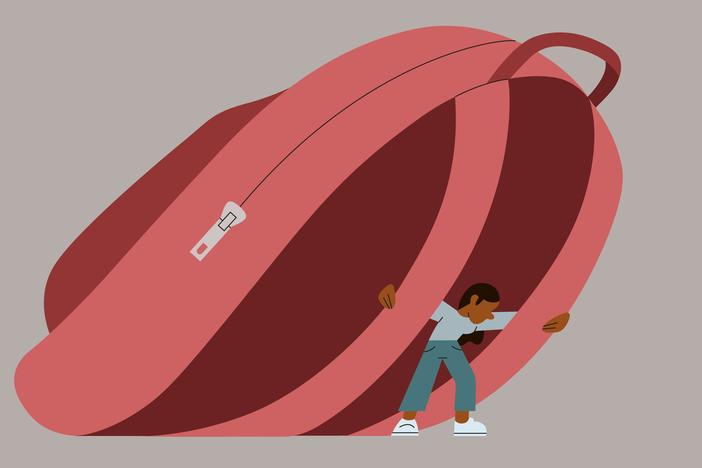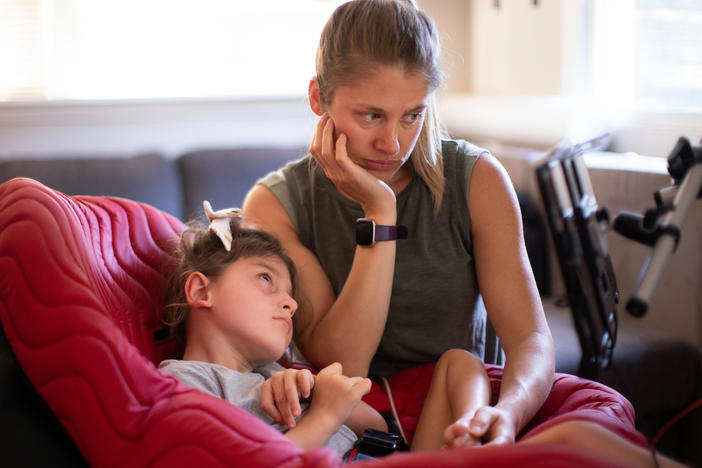Section Branding
Header Content
Birthday parties and sleepovers are back as parents welcome COVID vaccine for kids
Primary Content
Sleepovers. Birthday parties. Long-awaited family reunions.
Those are among the activities and gatherings that parents told NPR they hope to make possible for their kids following a formal recommendation of Pfizer's COVID-19 vaccine for children ages 5 to 11 from the Centers for Disease Control and Prevention.
CDC Director Rochelle Walensky gave her recommendation Tuesday evening, just a few hours after a panel advising the CDC voted unanimously to support the vaccine for the age group, and days after the Food and Drug Administration authorized its use for this age group. The latest pandemic milestone makes around 28 million kids in the U.S. eligible to receive the vaccine in a lower dose than what adults are given.
Living with less fear
Many parents, including Eric Nichols and Nell Hathaway, expressed relief and hope that this would mark another step in the direction of normalcy. Their daughter Harper is 5, and though Nichols and Hathaway are both vaccinated, they say they're still limited in what they feel safe doing as a family until everyone has had their shots.
"You can't eat at restaurants or go to the children's museum ... here because of the risk," Hathaway says. "It just really has limited her life."
That includes not being able to see family. Nichols says it's been two years since they've seen his side of the family in Ohio. But they're planning to make the trip from Olympia, Wash. this year, and Nichols says it will "be a very big day when we get to hug them."
Hathaway says it's been nearly two years of living with constant stress over the pandemic. Not all of that will go away, but she's looking forward to having less fear once Harper is vaccinated.
"Seeing family in Ohio is really important and it's kind of scary," they say. "We're going this November for Thanksgiving, but we're really hoping to at least get the first shot before then, because the relief of our safety is just greatly reduced when she has it."
Some of that relief came Wednesday morning when they were able to secure an appointment for Harper for next Monday.
Families with kids under 5
The latest vaccine authorization and CDC guidance means that some families may be completely vaccinated. But in many families, not all children are old enough to receive the vaccine.
Mabel Cordero Leathem is a mom to a 6-year-old daughter and a 4-year-old son. She says she and her husband have been following the news leading up to this moment closely, and are excited to soon have one more family member vaccinated.
Cordero Leathem says she's looking forward to giving her daughter the childhood rite of passage that is a sleepover with a friend (whose family is also vaccinated).
"You know, you can have playdates ... but to me the idea of having another child [from another family] in my home, you know, making them breakfast, sharing our air ... that's like the closest you can get, right? And it's just so joyful," she says. "I'm ready for that."
The family will remain cautious because of their son who's not yet eligible for a vaccine, Cordero Leathem says. But this current phase will give their daughter "that little bit of extra freedom" to enjoy her friendships without as much anxiety.
The parents who plan to wait
While some parents are planning to vaccinate their kids as soon as possible, others are planning to wait a little bit before scheduling those shots.
A recent Kaiser Family Foundation survey showed how parents feel about vaccinating the 5-11 age group varies widely. Nearly a third of parents said they were eager to secure a vaccine for their child in this age group upon authorization. Another third said they wanted to wait and see how the vaccine works in this age group before scheduling their own appointments. And the last third of parents said they do not plan on getting their child the vaccine.
In Greenville, N.C., Heather Gilbert and her husband, who works in family medicine, fall more into the second group of parents who are waiting to see how the vaccine does in a larger group of kids, specifically when it comes to side effects like myocarditis, a form of heart inflammation. The side effect has shown to be rare after COVID vaccinations, with the CDC reporting 877 confirmed cases in people 30 or younger with no resulting deaths.
"We just want to wait until there is more of a population that's been recorded and studied to make sure that the side effects — the adverse side effects — aren't outweighing the benefits for the vaccine," Gilbert says.
Gilbert says she is supportive of parents who do want to get their kids vaccinated immediately, but that the risk calculus for her family is slightly different.
Both she and her husband are fully vaccinated, and the couple's two daughters, ages 6 and 7, are homeschooled. Gilbert says they wear masks when in indoor spaces and all of their playdates are outside. But overall, they're not in environments with large groups of people indoors.
The family does belong to a large church, but because of a lack of masks on parents and kids, they've continued attending worship virtually, Gilbert says.
She says she'd like to get her girls back to in-person church sooner rather than later and hopes to revisit the conversation on COVID vaccinations at the beginning of the new year.
"We know that vaccines, what they're given, have a pretty quick turnaround for reaction time, so it shouldn't take that long once people start getting their children vaccinated to see whether there are a substantial amount of adverse side effects or not," Gilbert says. "I'm hoping by the beginning of January we can revisit that topic after a couple hundred thousand children have been vaccinated, and there's a larger population that's been looked at."
For this story, we reached out to our audience and heard from more than 3,000 parents on what they're planning to do when it comes to vaccinating their kids in the 5-11 year-old age group, and from parents who have kids that are not yet eligible for a vaccine.
Copyright 2021 NPR. To see more, visit https://www.npr.org.
Bottom Content





